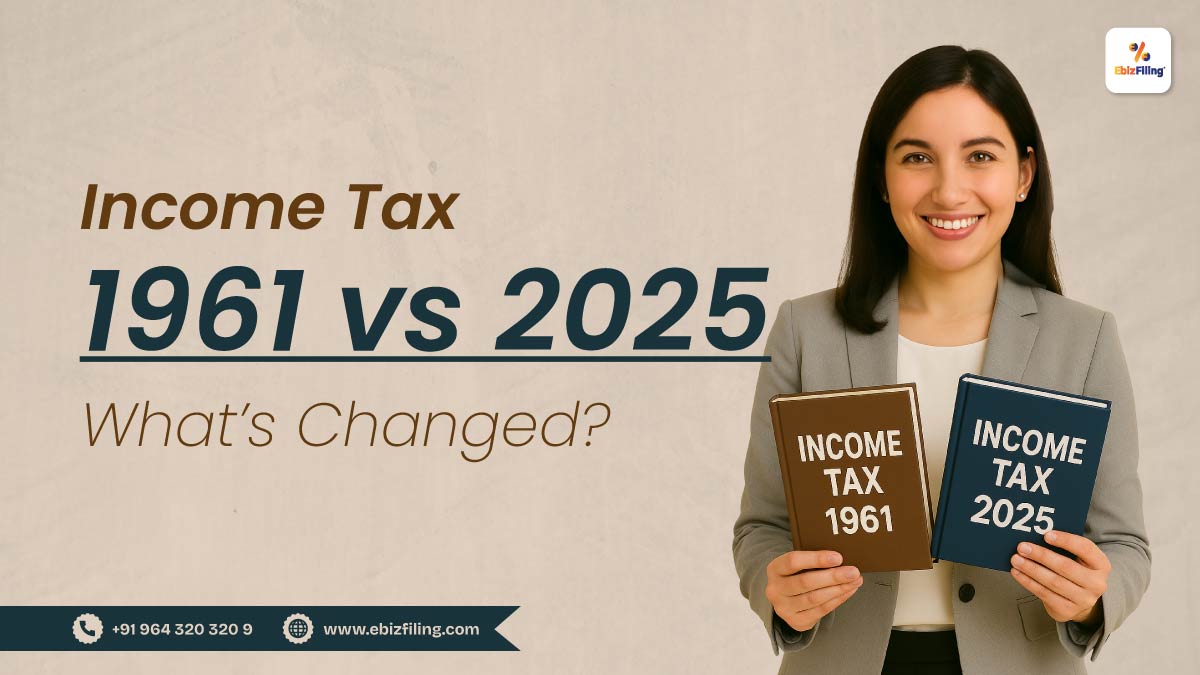
-
August 28, 2025
-
ByDhruvi D
Income-Tax 1961 and 2025: New Income Tax Bill 2025 Highlights Side-by-Side
Introduction
The Income-Tax Act, 1961, guided India’s taxation for over 60 years but grew complex with time. To simplify and modernize the law, the government introduced the New Income Tax Bill 2025. This blog presents a side-by-side look at the 1961 Act and the 2025 Bill, highlighting key changes as published on the official government website.
What is the new income tax bill 2025?
The Income-Tax Act, 1961, has been India’s core tax legislation for over sixty years. While it laid the foundation of direct taxation, repeated amendments made it bulky, complex, and difficult for taxpayers to interpret. By 2024, the law had grown into thousands of sections, explanations, and provisos that often led to confusion and disputes.
The New Income Tax Bill 2025 was introduced to replace this outdated framework with a clearer and simpler law.
According to the Income Tax Department’s official website, the new Bill focuses on:
-
Simplification of language – Instead of long, technical sentences, the Bill uses plain wording to make the law more readable.
-
Reorganized structure – Provisions are arranged logically, with related rules grouped together for easy reference.
-
Reduced bulk – Several redundant clauses from the 1961 Act have been dropped, bringing down the size of the law significantly.
-
Clear tax rates and provisions – Important details such as rates are tabulated, eliminating the need to cross-reference multiple sections.
In essence, while the 1961 Act became known for its complexity, the 2025 Bill marks a fresh beginning, aiming to create a law that is modern, concise, and taxpayer-friendly.
Side-by-Side: Income tax bill 1961 and Income tax bill 2025
|
Feature |
Income Tax Act 1961 |
New Income Tax Bill 2025 |
|
Core Purpose |
Original tax code enacted in 1961, expanded and amended over decades |
A comprehensive simplification of the 1961 Act was introduced to make the law modern and clear |
|
Navigator Tool |
Not available |
Provides a Navigator Utility to map each section of the 1961 Act with the corresponding clause in the 2025 Bill |
|
Executive Summary |
Not available |
Includes a Press Release that serves as an Executive Summary explaining how the Bill simplifies the law |
|
Auxiliary Information |
Not available |
Contains General FAQs that outline the scope and objectives of the new Bill |
|
Ease of Use |
Complex structure and lengthy legal language developed over time |
Simplified provisions, reorganized structure, and tools for easier interpretation |
In essence:
The Income Tax Act 1961 represents decades of amendments that made the law bulky and complex. The New Income Tax Bill 2025, on the other hand, offers a simplified and reorganized version supported by tools like the Navigator, an executive summary, and FAQs. It is designed to reduce confusion, improve clarity, and make compliance easier for taxpayers and professionals alike.
General FAQs on the Broad scope of New Income-tax Bill 2025
The Government of India has officially published a detailed set of Frequently Asked Questions (FAQs) on the New Income Tax Bill 2025. These FAQs explain why the 1961 Act needed replacement, what changes have been introduced in the new Bill, and how the law has been simplified. They also cover topics such as the removal of redundant provisions, the use of the term “tax year,” treatment of non-profit organizations, changes in TDS/TCS, and how the old and new provisions will co-exist.
For authenticity, the complete FAQs are available directly on the Income Tax Department website.
Frequently asked questions on Income tax bill 2025
When will the New Income Tax Bill 2025 come into effect?
The New Income Tax Bill 2025 was passed by Parliament, received Presidential assent in August 2025, and is set to come into force from April 1, 2026.
Does the New Bill introduce any new taxes?
No, the New Income Tax Bill 2025 does not introduce any fresh taxes; it focuses solely on simplifying and modernizing the existing tax structure.
What replaces the concepts of ‘previous year’ and ‘assessment year’?
The Bill replaces both ‘previous year’ and ‘assessment year’ with a unified concept called the “tax year,” which simplifies timelines and computations.
How much has the law been simplified in terms of structure?
The Bill reduces the law from 819 sections in 47 chapters under the old Act to 536 sections across 23 chapters, and decreases word count from over 5 lakh to approximately 2.6 lakh.
What is the annual basic exemption limit under the new law?
The New Bill retains the exemption framework as updated up to Finance Bill 2025, including revised slab benefits for middle-income taxpayers.
What improvements have been made to tax assessments?
The new Bill aligns with ongoing digital reforms, including faceless assessments introduced earlier, to ensure simplified and transparent compliance.
Are there changes in how refunds and notices are handled?
Yes, the Bill allows for faster refunds even after ITR deadlines, and requires that tax officials issue notices before taking any enforcement action.
How are virtual digital assets treated under the new Bill?
The New Income Tax Act 2025 broadens the definition of “undisclosed income” to include virtual digital assets like cryptocurrency explicitly.
What support tools are available to help taxpayers navigate the new law?
The Income Tax Department has introduced a Navigator Utility, executive summaries, and FAQs to help map old provisions to the new Bill and make it easier to understand.
Are there any significant policy changes in exemptions or deductions?
No major policy changes have been introduced. Instead, the Bill incorporates existing amendments up to the Finance Bill 2025 in a more organized, simplified format.
Income Tax Returns
File your Income Tax Returns easily with EbizFiling – Fast & Reliable
About Ebizfiling -










February 26, 2026 By Dhruvi D
How to Register an LLP in India for NRIs & Foreign Nationals? (2026) Introduction Why Choose an LLP Structure in India? India’s robust economic development, startup ecosystem, and lenient FDI policies continue to draw in international investors. Even for foreign […]
February 28, 2026 By Steffy A
Top 10 CA Firms in India- 2026 updated list Introduction Many Indian businesses suffer tax penalties due to the strict tax deadlines and the many confusing tax laws. As a business owner in India, the best option is to find […]
February 26, 2026 By Steffy A
Logistics Accounting Guide 2026: Best Practices for US Businesses Introduction For any US business operating in logistics, strong logistics accounting is no longer optional. It keeps your cash flow steady, your costs under control, and your profits protected. […]